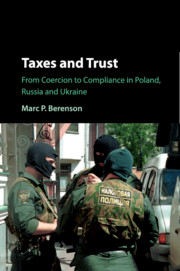Book contents
- Taxes and Trust
- Taxes and Trust
- Copyright page
- Dedication
- Contents
- Figures
- Tables
- Acknowledgements
- 1 From a Coercive to a Modern Tax State
- 2 Trust and Post-communist Policy Implementation
- 3 Reinterpreting History to Recreate the State
- 4 Creating Post-communist Tax Regimes and Measuring Tax Compliance
- 5 Building Trust, Instilling Fear
- 6 Citizens, Subjects and Slackers and Paying Taxes
- 7 All Together?
- 8 Towards Greater Trust and Tax Compliance
- Book part
- Bibliography
- Index
- References
Bibliography
Published online by Cambridge University Press: 12 January 2018
- Taxes and Trust
- Taxes and Trust
- Copyright page
- Dedication
- Contents
- Figures
- Tables
- Acknowledgements
- 1 From a Coercive to a Modern Tax State
- 2 Trust and Post-communist Policy Implementation
- 3 Reinterpreting History to Recreate the State
- 4 Creating Post-communist Tax Regimes and Measuring Tax Compliance
- 5 Building Trust, Instilling Fear
- 6 Citizens, Subjects and Slackers and Paying Taxes
- 7 All Together?
- 8 Towards Greater Trust and Tax Compliance
- Book part
- Bibliography
- Index
- References
Summary
- Type
- Chapter
- Information
- Taxes and TrustFrom Coercion to Compliance in Poland, Russia and Ukraine, pp. 326 - 352Publisher: Cambridge University PressPrint publication year: 2018
- Creative Commons
- This content is Open Access and distributed under the terms of the Creative Commons Attribution licence CC-BY-NC 4.0 https://creativecommons.org/cclicenses/



